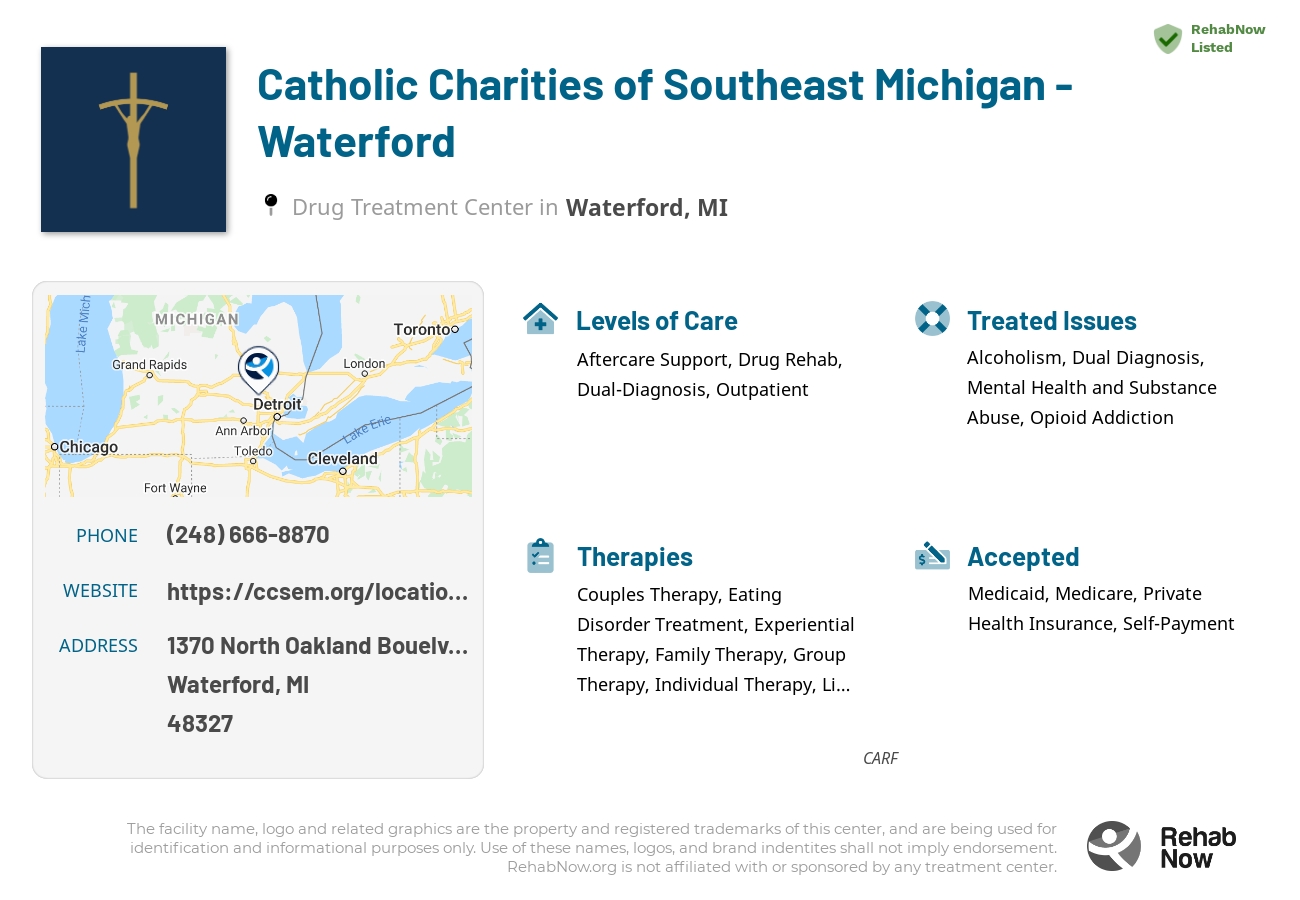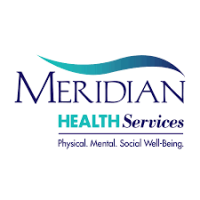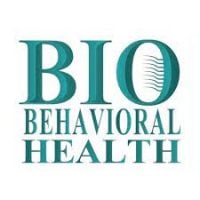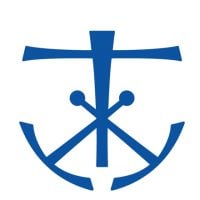Catholic Charities of Southeast Michigan - Waterford
Drug Rehab Center in Waterford, Michigan
Catholic Charities of Southeast Michigan - Waterford provides a range of evidence-based treatments and counseling services for individuals struggling with addiction and substance abuse, as well as a Community Recovery Center with additional resources and support.
About Catholic Charities of Southeast Michigan - Waterford in Michigan
Catholic Charities of Southeast Michigan - Waterford is a non-profit organization located in Waterford, Michigan that helps individuals suffering from substance use and addiction. They provide a range of services that include mental health and addiction counseling, case management, addiction support groups, crisis prevention and intervention, and recovery services. They also have an intensive outpatient program for individuals who need more intensive treatment.
At Catholic Charities of Southeast Michigan - Waterford, individuals can receive evidence-based treatments and counseling to help them through the recovery process. They provide a range of therapies, including Cognitive Behavioral Therapy, Dialectical Behavior Therapy, and Motivational Interviewing, to help individuals gain better self-regulation, manage their emotions, and develop coping skills. Additionally, they offer medication-assisted treatment and medication management. Clients at Catholic Charities of Southeast Michigan – Waterford benefit from a compassionate and supportive environment to get the help they need.
Catholic Charities of Southeast Michigan - Waterford is accredited by The Joint Commission, licensed by the Michigan Department of Licensing and Regulatory Affairs and certified by the Michigan Department of Health and Human Services. In addition, the organization has received awards from the State of Michigan for its commitment to providing quality services to those in need. Catholic Charities of Southeast Michigan – Waterford also has a Community Recovery Center that offers a range of resources and support for individuals struggling with addiction and substance abuse, including 12-Step meetings, SMART Recovery groups, and educational classes.
Genders
Ages
Modality
Additional
Accreditations

CARF
The Commission on Accreditation of Rehabilitation Facilities (CARF) is a non-profit organization that specifically accredits rehab organizations. Founded in 1966, CARF's, mission is to help service providers like rehab facilities maintain high standards of care.
Conditions and Issues Treated
Treatment for opioid addiction is best made with the help of medical professionals who are experienced in dealing with these types of drugs. This treatment can involve medications, exercise, behavioral therapy, and counseling sessions. It is important to note that the effectiveness of treatments for opioid addiction vary, so it is vital to research which treatment options are suitable for each individual.
Many people who struggle with opioid addiction need to attend specific programs like methadone , Suboxone or Vivitrol clinics.
These types of programs will provide the patient with legal, prescription medications that can help them overcome their cravings for illegal opioids like heroin or fentanyl . If the patient has a chronic condition like Hepatitis C, they must undergo treatment before they can begin taking these medications.
Individuals who are addicted to drugs and/or alcohol often have one or more co-occurring mental health disorders. Addressing both the addiction and the mental health problems at facilities like Catholic Charities of Southeast Michigan - Waterford can be very beneficial for these individuals.
Common mental health conditions that often co-occur with addiction include:
- Anxiety Disorders – People with drug and alcohol problems often suffer from anxiety disorders such as panic disorder, obsessive-compulsive disorder, social anxiety disorder, and generalized anxiety disorder.
- Depression – One of the most common mental illnesses co-occurring with addiction is major depressive disorder.
- Attention-deficit hyperactivity disorder (ADHD) – Many people with drug and alcohol problems also suffer from ADHD.
- Bipolar Disorder – People with bipolar disorder are more likely to suffer from drug and alcohol problems than the general population, and vice versa.
Levels of Care Offered
This center offers a variety of custom treatment tailored to individual recovery. Currently available are Aftercare Support, Drug Rehab, Dual-Diagnosis, Outpatient, with additional therapies available as listed below.
Outpatient treatment can be considered the lowest intensity level of addiction treatment in Waterford, MI. It is ideal for early phase addiction or lower intensity addictions. Catholic Charities of Southeast Michigan - Waterford peer group support, 12-step programs, and individual counseling are likely to be involved.
Aftercare support is vital to those who have completed a drug or alcohol treatment program. This support comes in individual and family counseling, treatment of psychiatric and other medical conditions, and medications to reduce cravings. It helps recovering addicts adjust to normal day-to-day activities and can last for a year or longer.
The majority of drug and alcohol addicts who receive aftercare treatment do not relapse. It is estimated that without aftercare, the relapse rate will be between 70 to 90 percent for most people. Aftercare is the final stage in addiction recovery, but it will also help maintain sobriety if relapse does occur.
Therapies & Programs
Individual therapy is ideal for addicts who want to focus on themselves. It can also be helpful for those whose withdrawal symptoms are exacerbated by the presence of other people.
Benefits of individual therapy are:
- Access to a personalized treatment plan that focuses on the individual needs of the addict
- More privacy during treatment sessions
- Better personal development through introspection
- Increased self-awareness regarding addictive tendencies in order to avoid relapse
- Greater potential for a long-term recovery plan
- Receiving professional advice and detox assistance from medical staff
Couples therapy is a treatment method used to help couples in which at least one member of the couple has a drug addiction. Couples therapy can be used whether the addicted partner is using drugs or in recovery. An additional benefit of couples therapy is that it can help make other types of treatment, such as 12-step programs, more effective.
Family therapy can help you and your family deal with old issues that may trigger substance abuse. The idea behind family therapy for drug addiction is that you are never fully healed from substance abuse until you’ve healed your relationship with your family, too. To get sober, you need to find a different way to cope with the pain in your life.
This is when a group of people in various stages of recovery meet up and discuss their experiences, triggers, successes, failures, and even alternative therapies! Unlike support groups where everyone already knows each other, group therapy is conducted along side outpatient or inpatient treatment at Catholic Charities of Southeast Michigan - Waterford.
Trauma therapy is a clinical process that helps individuals deal with mental stress often caused by traumatic events. The therapist helps the person identify, understand and work through the problem. This is done with the help of talking about it in group or one-on-one counseling sessions.
Therapists use relaxation, role-playing, art, and music to help the person open up about what is bothering them. Some examples include:
- Talking about the traumatic event and how it affected them.
- Helping those who have PTSD to deal with their nightmares and recurring memories.
- Working with individuals to resolve the issues triggering the stress, whether seeing someone who reminds them of what happened or feeling helpless.
The individual is also encouraged to help others that are struggling with similar problems. This often helps them feel empowered and gives them hope.
Trauma therapy is not for everyone; it is usually reserved for people who have recently experienced a traumatic event and struggle to get over it. It is generally done for children, teenage victims of sexual assault, and war veterans.
CBT is a psychotherapy approach and method. [ws-nap-name] people to examine how their thoughts, including habitual harmful and inaccurate thinking, affect their actions. CBT is based on the idea that rigid, inflexible thinking leads to poor stress management, which leads to emotional distress.
Similarly, CBT helps people identify and change negative behaviors. It makes you question your perceptions and ask if they are realistic. CBT asks people to examine their behaviors and emotional responses and how they affect their lives. CBT aims to change people’s thinking and behavior to lead a more balanced and healthy life.
Moreover, CBT has been shown to reduce anxiety disorders, depression, and symptoms associated with harmful thoughts or actions.
Those struggling with addiction can benefit from learning certain life skills. It is not as simple as quitting drinking or taking drugs and thinking that the hard part is over. Being sober means living a whole new way of life. Many recovering addicts have found that they need to develop talents like time management, organization, communication skills, socialization skills, and self-esteem to make their life in sobriety work, Catholic Charities of Southeast Michigan - Waterford is here to help with that.
Patient Experience
Experiential Therapy at Catholic Charities of Southeast Michigan - Waterford
Experiential Therapy is a type of therapy that involves activity to recreate situations that may have caused trauma or negative emotions. Experiential therapy at Catholic Charities of Southeast Michigan - Waterford in Waterford, MI can involve acting, props, arts and crafts, animal care or other tools that may be effective. This therapy is done on an individual basis and can help revisit and heal from past traumas. Trust between the therapist and individual is important for success. Experiential therapy can help you more closely become you and move through life positively and authentically.
Payment Options Accepted
For specific insurance or payment methods please contact us.
Is your insurance accepted?
Ask an expert, call (888) 674-0062
Catholic Charities of Southeast Michigan Associated Centers
Discover treatment facilities under the same provider.
- Catholic Charities of Southeast Michigan - Lapeer in Lapeer, MI
- Catholic Social Services of Oakland County in Pontiac, MI
- Catholic Charities of Southeast Michigan - Lake Orion in Lake Orion, MI
- Catholic Charities of Southeast Michigan - Clinton Township in Clinton Township, MI
- Catholic Charities of Southeast Michigan - Port Huron in Port Huron, MI
Learn More About Catholic Charities of Southeast Michigan Centers
Additional Details
Specifics, location, and helpful extra information.
Waterford, Michigan 48327 Phone Number(248) 666-8870 Meta DetailsUpdated November 25, 2023
Staff Verified
Catholic Charities of Southeast Michigan - Waterford Patient Reviews
There are no reviews yet. Be the first one to write one.
Waterford, Michigan Addiction Information
Michigan has the second-highest rate of drug and alcohol abuse in the nation. Heroin is linked to more than 50% of the state's hepatitis C cases. Marijuana is the drug most often associated with crimes in Michigan, followed by methamphetamines. Opioids alone are responsible for almost 20% of all drug overdose deaths in Michigan.
18,000 people struggle with drug addiction in Waterford, Michigan. Over 1,000 hospitalizations were due to drug overdoses in the area in 2016. The most commonly abused drugs in Waterford, Michigan, are marijuana, cocaine, and heroin. In addition, alcohol abuse is a major problem, with an alcohol abuse rate of 9.2%. Drug treatment in Waterford depends on the facility. However, most drug treatment programs will provide a combination of therapies and treatments.
Treatment in Nearby Cities
- Owosso, MI (44.6 mi.)
- L'anse, MI (375.8 mi.)
- Tecumseh, MI (52.3 mi.)
- Farmington Hills, MI (11.4 mi.)
- Kincheloe, MI (254.8 mi.)
Centers near Catholic Charities of Southeast Michigan - Waterford
The facility name, logo and brand are the property and registered trademarks of Catholic Charities of Southeast Michigan - Waterford, and are being used for identification and informational purposes only. Use of these names, logos and brands shall not imply endorsement. RehabNow.org is not affiliated with or sponsored by Catholic Charities of Southeast Michigan - Waterford.









